
Pope Condemns Devastating Hunger Ravaging Gaza's Civilians
Pope Francis Escalates Diplomatic Pressure on Gaza Crisis as Vatican Emerges as Key Mediator
Pope Francis issued his most urgent appeal yet for war victims worldwide on Sunday, singling out Gaza's civilian population as facing catastrophic hunger amid ongoing violence. The Vatican's increasingly vocal stance positions the Holy See as a potential diplomatic bridge in multiple global conflicts, from the Middle East to Southeast Asia.
Vatican Amplifies Humanitarian Diplomacy
Speaking after Sunday prayers, Pope Francis told world leaders that his "heart is especially with all those who suffer due to conflicts and violence in the world." His remarks, broadcast through Vatican News, represented the latest in a series of increasingly direct papal interventions in global crises.
The Pope's specific focus on Gaza was particularly striking. "I follow with great concern the very serious humanitarian situation in Gaza, where hunger is crushing the civilian population who continue to be exposed to violence and death," he said, renewing calls for an immediate ceasefire, hostage releases, and full respect for international humanitarian law.
Strategic Timing Reflects Vatican's Growing Role
The papal statement comes as traditional diplomatic channels have struggled to produce breakthrough agreements in Gaza. The Vatican's unique position—maintaining relationships with both Israeli and Palestinian authorities while commanding global moral authority—makes it an increasingly valuable mediator.
This approach mirrors successful Vatican diplomacy in past decades, including Pope John Paul II's role in ending the Cold War and Pope Francis's own mediation in U.S.-Cuba relations in 2014. The Holy See's diplomatic corps, operating in 183 countries, provides intelligence and influence networks that rival major powers.
Broader Regional Focus Signals Systematic Approach
Beyond Gaza, Pope Francis extended prayers to "those affected on the borders between Thailand and Cambodia, especially displaced children and families" and "victims of violence in southern Syria." This geographic spread suggests the Vatican is positioning itself as a voice for forgotten conflicts that receive limited international attention.
Southeast Asian Displacement Crisis
The Thailand-Cambodia border reference likely addresses ongoing issues with Cambodian migrant workers and refugees—a crisis that has intensified since COVID-19 economic disruptions. By highlighting this alongside Gaza, the Pope demonstrates the Vatican's commitment to addressing suffering regardless of geopolitical significance.
Market and Geopolitical Implications
The Vatican's diplomatic activism could influence several key areas. Religious tourism and pilgrimage economies often respond to papal statements, while the Holy See's moral authority can shift public opinion in Catholic-majority countries that are key trading partners.
More significantly, Vatican mediation historically precedes major diplomatic breakthroughs. Financial markets and diplomatic observers will likely monitor whether the Pope's appeals translate into concrete mediation offers, particularly given the Vatican's successful track record in conflict resolution.
Comparison with Past Papal Interventions
Pope Francis's approach differs markedly from his predecessors. While previous popes often spoke in general terms about peace, Francis consistently names specific locations and calls out particular injustices. This direct approach has proven effective—his 2015 address to the U.S. Congress influenced American immigration policy debates, while his environmental encyclical shaped climate negotiations.
The current strategy suggests the Vatican believes traditional diplomatic channels have failed sufficiently to warrant more aggressive papal intervention. This represents a calculated risk, as unsuccessful mediation attempts could diminish the Holy See's future diplomatic capital.
Most Viewed News

 Layla Al Mansoori
Layla Al Mansoori






